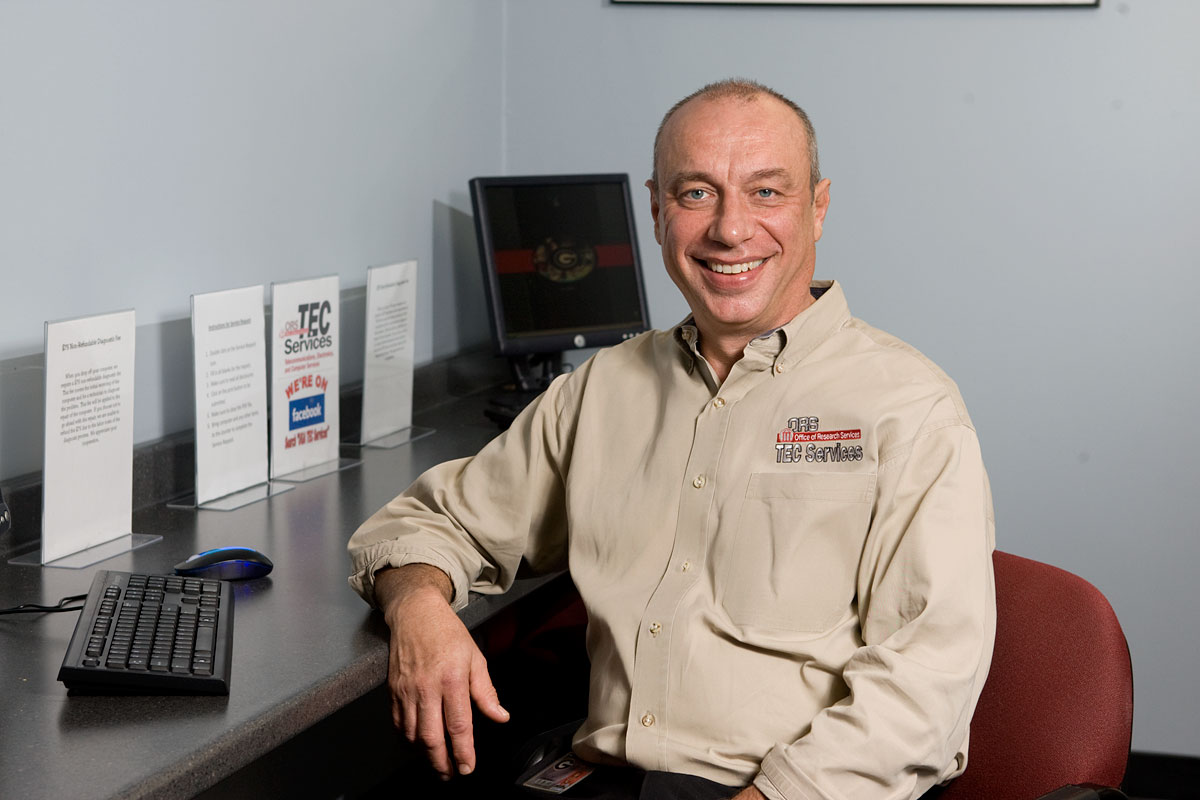The Telecommunications, Electronics and Computer Services department-part of the Office of Research Services within the Office of the Vice President for Research-handles the repair and maintenance needs for much of the scientific instrumentation across campus.
Better known as TEC Services (tec.uga.edu), the unit also comes to the rescue of students, faculty and staff with its most popular service: computer repair. The South Campus shop sees approximately 350 work requests each month, with a growing demand for scientific instrumentation maintenance.
Mike Stroup, who has managed TEC Services for more than 16 years, is proud of his staff’s ability to not only handle challenging jobs, but to expand their support capabilities in creative and cost-effective ways.
Columns: In what ways has TEC Services changed since you started there in 1993?
Stroup: In 1993, we were called the Electronics Design and Maintenance Shop.
We had very active sales of computer accessories and electronics parts and provided the full range of telecommunications network installation services across campus, including data, telephone and video.
Since then, we have stopped offering electronics design service, the telecommunications section has been transferred to the EITS Infrastructure Group and our counter sales have dropped with the increase in Internet shopping.
The single largest change, however, has been the shift of our primary PC customer base from UGA departments to students. In fact, 70 percent of our PC client base is now students.
Columns: How is TEC Services broadening its offerings?
Stroup: This August we opened a service station on the third floor of the Miller Learning Center, where students can drop off or pick up their PCs for repair or have viruses removed on site.
We also opened another PC repair drop-off/pick-up site at the UGA Bookstore.
At our facility on South Campus we just opened a new Customer Diagnostics and Testing Room. Clients there can demonstrate computer problems to a technician before the repair begins and test the repaired PC after service.
The Scientific Instrumentation Service Center also has rolled out a new annual service plan for rotary vane and rotary piston vacuum pumps that provide both remedial and preventive maintenance.
These types of pumps are used in everything from mass spectrometers to freeze driers. By partnering with a local vacuum pump repair company, TEC Services can now service virtually any brand of vacuum pump.
We’re also excited that Dell and Lenovo will soon be providing a local stock of warranty parts for their notebooks and desktops. We expect to have that available by early November.
Columns: What is TEC Services doing to save money or to help other departments save money?
Stroup: Our IT Support Plan guarantees priority care on warranty and non-warranty PC repair services, discounted fixed labor rates, a waiver of on-site fees and preferred access to parts stock.
Our New Printer Service Agreement also permits customers to budget for printer maintenance for the entire year by purchasing a bundle of service calls at a
discount.
Because these calls are not associated with a specific printer, the customer can apply them to any eligible HP or Dell laser printer.
Columns: What is TEC Services doing to be more “green”?
Stroup: We recycle batteries from laptops and also rebuild Hewlett-Packard laser printers that no longer meet the needs of particular UGA departments but would serve the needs of other departments very well. We also continue to look for ways to recycle material.
Columns: What is some of the more challenging or unusual work TEC Services has done?
Stroup: Though TEC Services no longer installs telecommunications cabling, the single largest project that it has ever managed was in this area.
In the late 1990s, we installed the majority of the first fiber optic cabling backbone, called Project Venus, on the UGA campus. It was a huge undertaking.
One of our ongoing challenges is keeping the Inductively Coupled Plasma spectrometer operational. This is a 1960s vintage item managed by the Center for Applied Isotope Studies, that uses many of the same radio-frequency components that were used in the old radio stations, so we occasionally have to hunt down parts from 40-year-old transmitters.


